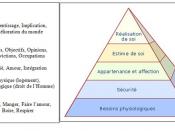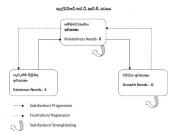Organizational behavior is affected by different factors, two of which are motivation and conflict management. Every organization has some sort of plan in regard to each, with some methods being successful in promoting good organizational behavior, while others need work. A closer look will be made into different motivational theories, along with a look at different organizations and how each applies different strategies for motivation and conflict management.
Motivational TheoriesMany motivational theories exist, yet each can be classified into two different categories, content theories and process theories. "Content theories include Maslow's heirarchy of needs theory, Alderfer's ERG theory, Mclelland's aquired needs theory, and Herzberg's two-factor theory, all of which focus primarily on individual needs and the influence of blocked needs (Shermerhorn, Hunt & Osborn, 2008)." Maslow's heirarchy of needs theory has five levels of needs that must be met, with each level having to be satisfied before moving to the next level.
Motivation is based on helping to satisfy an individuals need to complete the different levels of needs. This theory is a popular theory, and the base for the next theory. The next motivational theory is Alderfer's ERG theory. This theory is similar to Maslow's heirarchy of needs in that different levels of needs exist, however, Alderfer believes only three levels exist. Alderfer also believes that more than one level of need can be satisfied at any given time.
Mclelland's aquired needs theory also outlines three levels of needs, though according to Mclelland, these are needs that are aquired based on life experiences (Shermerhorn, Hunt & Osborn, 2008). To motivate using Mclelland's aquired needs theory, management needs to pay attention to what the aquired needs are of the employees and work to help fulfill those needs. The last of the content theories is Herzberg's two-factor thoery. This...


